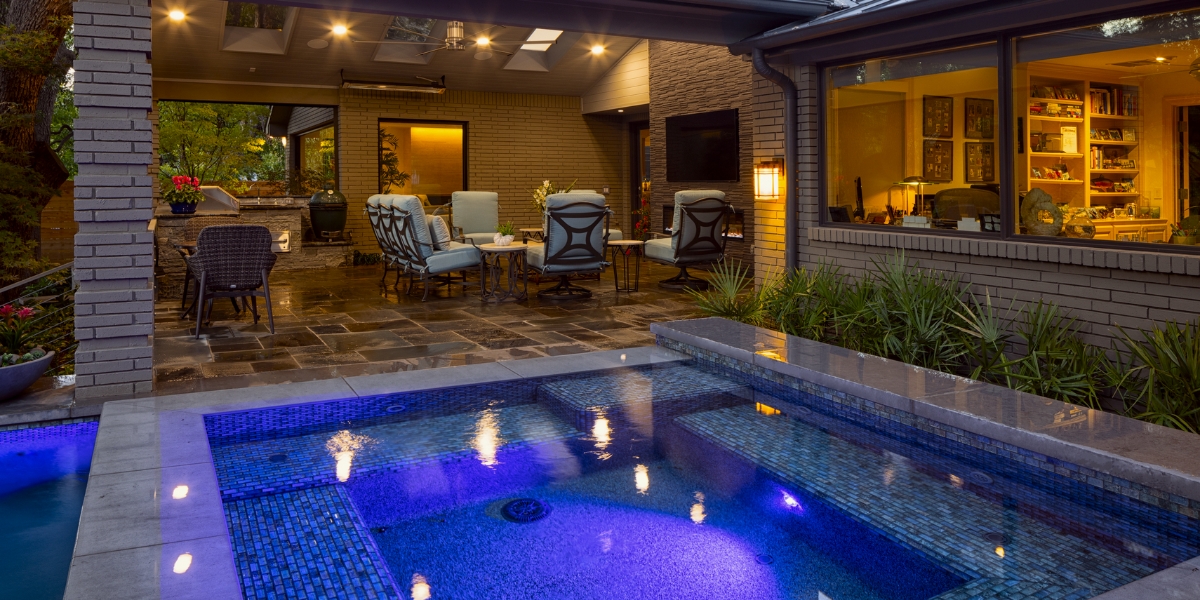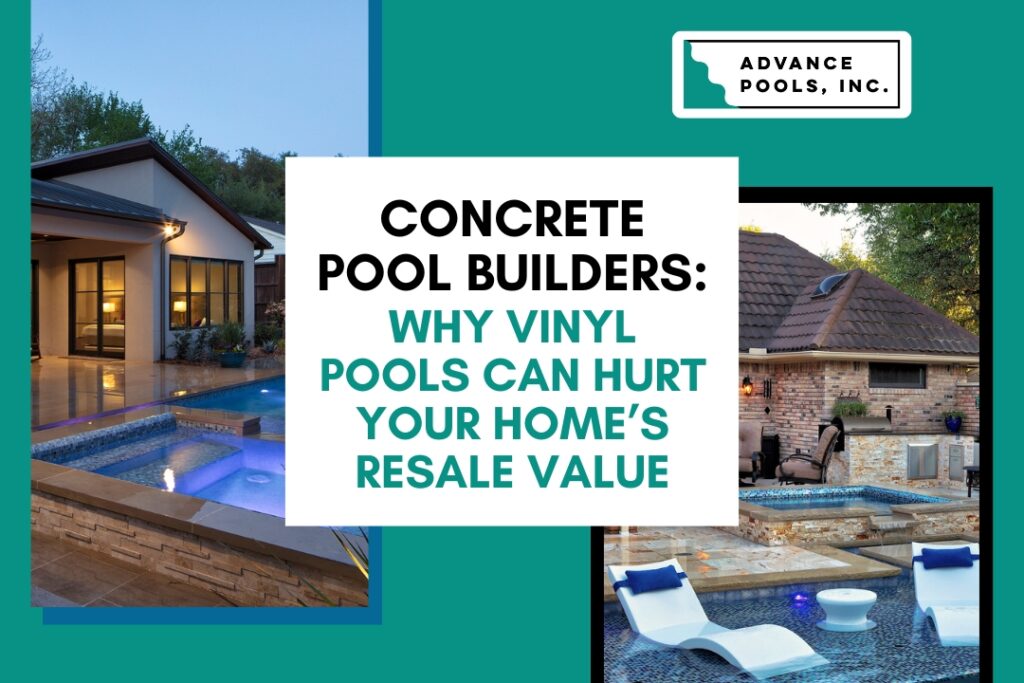
Concrete Pools vs Vinyl: Which Option is Right for You?
If you’re leaning towards a concrete pool over a vinyl lined pool, we tend to agree with you. Let’s break down the reasons why so many people search for “concrete pool builders near me” over vinyl lined pool installers and how — with concrete — you can have a pool that is far more durable with far better aesthetics.
Let’s be upfront about one thing: Some people do prefer pools with vinyl liners over concrete pools. For example, they are perfect for people who want the biggest pool for the least amount of money — and who only plan to live in their home for a couple of years. But if you’re building the pool of your dreams for a place you want to make a home, concrete pools are usually the best choice.
Why Are Vinyl Lined Pools Less Durable?
Vinyl liners for inground pools are typically less than a millimeter thick. As a vinyl lined pool owner, you’re just one broken tree branch, dog claw, or sharp-edged child’s toy away from a rip in the vinyl. While thicker vinyl can be more durable, it’s also much more expensive. At that point — why not just use your initial investment for a custom-designed concrete pool oasis instead?
Another risk to the durability of a vinyl lined pool is the wet/dry cycle. When the vinyl dries, it can shrink, develop wrinkles and even crack. When areas are repeatedly going through the wet dry cycle, the vinyl weakens. It becomes at an even greater risk of punctures and tears, unfortunately.
Vinyl lined inground pools usually need replacing every 5 to 9 years, unfortunately. Sharp objects will not harm a concrete pool’s plaster, nor will the wet/dry cycle.
Concrete Pools Don’t Wrinkle
Even on a vinyl lined pool’s best day—when it’s at its most beautiful, most people agree that the custom shapes and solid appearance of a concrete pool is still vastly more beautiful. That’s on the vinyl lined pool’s BEST day. Concrete offers better aesthetics in most people’s opinion — especially because they don’t wrinkle. While some people may prefer the look of vinyl pools, everyone can agree that wrinkles in a pool’s liner are not appealing to look at.
Unfortunately, underwater erosion, excess ground water during heavy rains, temperature changes, water loss and chemical reactions all cause vinyl pool liners to wrinkle. You may be alright with the wrinkles, but remember, wrinkles trap debris (that can endanger the integrity of your pool) and make cleaning efforts far more challenging (and in some places impossible). Wrinkles in the vinyl are risk spots that encourage algae and bacterial growth. Wrinkles also can cause vulnerable spots that can get caught by automatic pool cleaners or pool cleaning brushes leading to tearing.
When a pool gets large wrinkles, the only solution is draining the pool. But draining the pool comes with its own risks, because even when the pool is professionally drained and the wrinkles are professionally addressed, the liner can become torn during the process.
Speak To A Professional Today!
Are you ready to elevate your outdoor living experience with custom pool structures that inspire and delight?
Why Do Vinyl Lined Pools Decrease A Home’s Resale Value So Often?
While vinyl lined pools are typically cheaper than custom designed concrete pools, they are still a major upfront investment. You might think that this major investment would increase your home’s resale value. Unfortunately, when it comes to vinyl lined inground pools, your investment can often reduce the overall resale value of your home. If you intend to sell your home and you own a vinyl lined pool—you better make it quick before the lining starts giving indications that it will need replacement. As far as resale value goes, your best bet is a concrete pool.
Keep in mind, most people don’t want to commit to shelling out over five grand every 5-9 years when a vinyl liner needs replacing. Of course, even concrete pools need resurfacing, but it’s different to home buyers. That’s because a concrete pool only needs resurfacing every 10-20 years. This gives owners plenty of time to plan ahead. Concrete pool resurfacing is an expected maintenance, but it’s an expense you can plan for. While the need to replace a vinyl liner can spring up unexpectedly, concrete pool resurfacing does not.

Why Do People Say That Vinyl Lined Pools Lack Aesthetics?
From a distance, a vinyl lined pool can look just as gorgeous as a concrete pool. It can even appear tiled or made of stone, depending on the liner. But when you’re close to the vinyl lined pool, it’s obvious to everyone that the tiles are not real. The stones are printed on. The lack of authenticity is felt — whether we are cognitively aware of why. Real tile, real plaster and real stone found in concrete inground pools offer authenticity, texture and rich sophistication. The texture and appearance can’t be replicated.
Concrete pools feel more charming and reach us at a deeper level. The durable, earthen feeling of concrete pools grounds us. Vinyl lined pools even smell different. At almost every level, concrete pools deliver superior aesthetics.
How Do I Choose Between Concrete Pool Builders Near Me?
To find a quality concrete pool installer, look for a company that has a long history of positive customer feedback and high-quality work. Look at online reviews and online portfolios. Make certain that your contractor is licensed and insured for your own protection.
Make sure your contractor is familiar with local ordinances and permitting requirements. Lastly, make sure that your contractor is willing to give you an itemized estimate upfront that includes labor costs. You will want that estimate to be as crystal clear as you want the water in your pool to be.
Advance Pools serves the Dallas area including Highland Park, Frisco, Allen, Plano, Richardson and the surrounding communities. Contact us today for a free concrete pool installation estimate!
